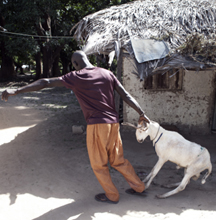To honor the willingness of Abraham to sacrifice his son as an act of obedience to God's command, Muslims around the world will celebrate Eid al-Adha this August. In the Senegal and Gambia (Senegambia) region, Muslims call the celebration by its Wolof name, Tobaski. (In Senegal , they call it Tabaski.)
Tobaski is also called the "Festival of the Sacrifice," in English, and is the second of two Islamic holidays celebrated worldwide each year, and considered the holier of the two. This year, the celebration starts in the evening of Saturday, August 11 and ends the evening of Sunday, August 12. This festival also marks the end of the Hajj pilgrimage to Mecca.
As the story goes in Islam and Christianity, before Abraham could sacrifice his son Ishmael on Mount Arafat, God provided a lamb to sacrifice instead. Accordingly, after Eid prayers and sermons, meat from a sacrificed animal is often divided into three parts. The family retains one-third of the share; another third is given to relatives, friends, and neighbors; and the remaining third is given to the poor and needy.
Men, women, and children are expected to dress in their finest clothing. Many people will also share gifts, visit one another, and share grilled meat and other food.
Tie-dye artist Lmin Manneh, who lives near the Sanchaba Garage (parking lot/taxi depot), in The Gambia, says he is preparing for Tobaski by “making a new gown (long men’s wear) and buying a ram.”
Is It Christmas, Memorial Day, or Halloween? No, It’s Tobaski!

Fatoumatta Sanyang, an IT student from Soma has similar plans. “I am preparing an outfit for myself and also (saving) some cash amount for "salibo" for the elderly people and kids.” (Salibo is when often dressed-up children greet you, and you reward with them a small amount of money or gift.)
Musa Njie, who is on break from studying mechanical engineering in China, says he has no plans to get ready for Tobaski. However, the Kerr Sering native adds, “As usual we will get together eat, enjoy, and share memories.”
Tobaski is always on the same day of the Islamic calendar. However, the date on the Gregorian calendar varies from year to year since the Islamic calendar is a lunar calendar and the Gregorian calendar is a solar calendar. Most of the world, including the United States, uses the Gregorian calendar, which Pope Gregory XIII originally implemented to change the date of Easter so it would be closer to the spring equinox.
The first of two Islamic holidays celebrated worldwide each year Eid al-Fitr, also called the "Festival of Breaking the Fast." Muslim worldwide celebrates during this festival to mark the end of Ramadan, the holy month of fasting.
Musa Njie, who is on break from studying mechanical engineering in China, says he has no plans to get ready for Tobaski. However, the Kerr Sering native adds, “As usual we will get together eat, enjoy, and share memories.”
Tobaski is always on the same day of the Islamic calendar. However, the date on the Gregorian calendar varies from year to year since the Islamic calendar is a lunar calendar and the Gregorian calendar is a solar calendar. Most of the world, including the United States, uses the Gregorian calendar, which Pope Gregory XIII originally implemented to change the date of Easter so it would be closer to the spring equinox.
The first of two Islamic holidays celebrated worldwide each year Eid al-Fitr, also called the "Festival of Breaking the Fast." Muslim worldwide celebrates during this festival to mark the end of Ramadan, the holy month of fasting.
Advertisers | Contact Us | Events | Links | Media Kit | Our Company | Payments Pier
Press Room | Print Cover Stories Archives | Electronic Issues and Talk Radio Archives | Writer's Guidelines






